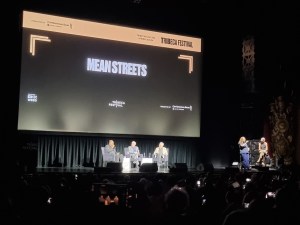Robert De Niro feels he’s been extremely “fortunate to wind up with Marty” for all these years, and Martin Scorsese returned the compliment as the actor and director sat down after a screening of Mean Streets, the 1973 film that marked their first collaboration, and Scorsese’s breakout. They went on to make nine more features together.
The two grew up together in Manhattan’s Lower East Side, an Italian enclave populated with low level mafiosi. De Niro’s “Johnny Boy” Civello in Mean Streets, a reckless but charming small-time gambler deeply in debt to loan sharks, was based on people they both knew, the duo told a Q&A with rapper Nas after the packed screening at the Beacon Theater. The climatic final scene, a car chase, shooting and crash, was inspired by a trauma Scorsese said he barely escaped – getting out of a car only a few minutes before it smashed.
The film, which starred an amazing Harvey Keitel as Charlie Cappa, a conflicted young gangster who tried to look out for his impetuous friend, was part of De Niro Con, a tribute to the Oscar-winning actor and co-founder of the Tribeca Festival.
De Niro and Scorsese met at age 16 and weren’t close growing up but knew of each other. At some point De Niro heard vaguely that “Marty was at NYU.” Years later they met at the house of Brian De Palma, who thought they’d be simpatico. They didn’t recognize each other at first, got to talking, and they really were.
Then came Mean Streets, then Taxi Driver (1976), New York, New York (1977), Raging Bull (1980), The King Of Comedy (1983), Goodfellas (1990), Cape Fear (1991), Casino (1995), The Irishman (2019) and Killers Of The Flower Moon (2023).
“There were different levels of trust,” Scorsese said. “On an artistic level there is trust. At a certain point, he’d say, ‘I have this idea’. And I said, ‘Don’t tell me, just do it.’ And invariably I’d like it.”
“And then we just had our own way of talking to each other, I guess. Often we were just talking about personal stuff, and the AD would come over and say, ‘Hey, we’ve got to shoot. So we felt comfortable in that way.”
Scorsese also said he learned a lot from De Niro, including how to act — like in a small Taxi Driver part. The director played a rude passenger in Travis Bickle’s taxi, filling in for an actor who’d had an accident.
“At the beginning of the scene, I tell him to put his flag down [how taxis used to signal they had a fare]. And he said, ‘Make me put the flag down.” He is not gonig to put the flag down unless he believes me playing that part … and what was happening is that he didn’t move his head. It was the back of his head. It was a pillar. Energy. Danger. I didn’t know if he was going to turn around and shoot me, or yell at me, and it made me go further and further and further into the character. It was really a great lesson on how to behave as a human being in front of the camera.”
Music in Mean Streets like in many Scorsese films was a character in itself. There was a bit of everything, including two Rolling Stones songs (Jumpin’ Jack Flash and Tell Me). Asked by Nas how they swung that at the time, not being huge names, Scorsese credited producer Jonathan Taplin. “We asked for three [songs]. We got two.”
“In the summer there was never any air conditioning, so sometimes we slept on the fire escape. And some guy would be playing big band music, and another opera, and Tony Bennett down the block. Really it became a soundtrack of our lives. We couldn’t imagine a quiet moment.”
L-R: Nas with Martin Scorsese and Robert De Niro

